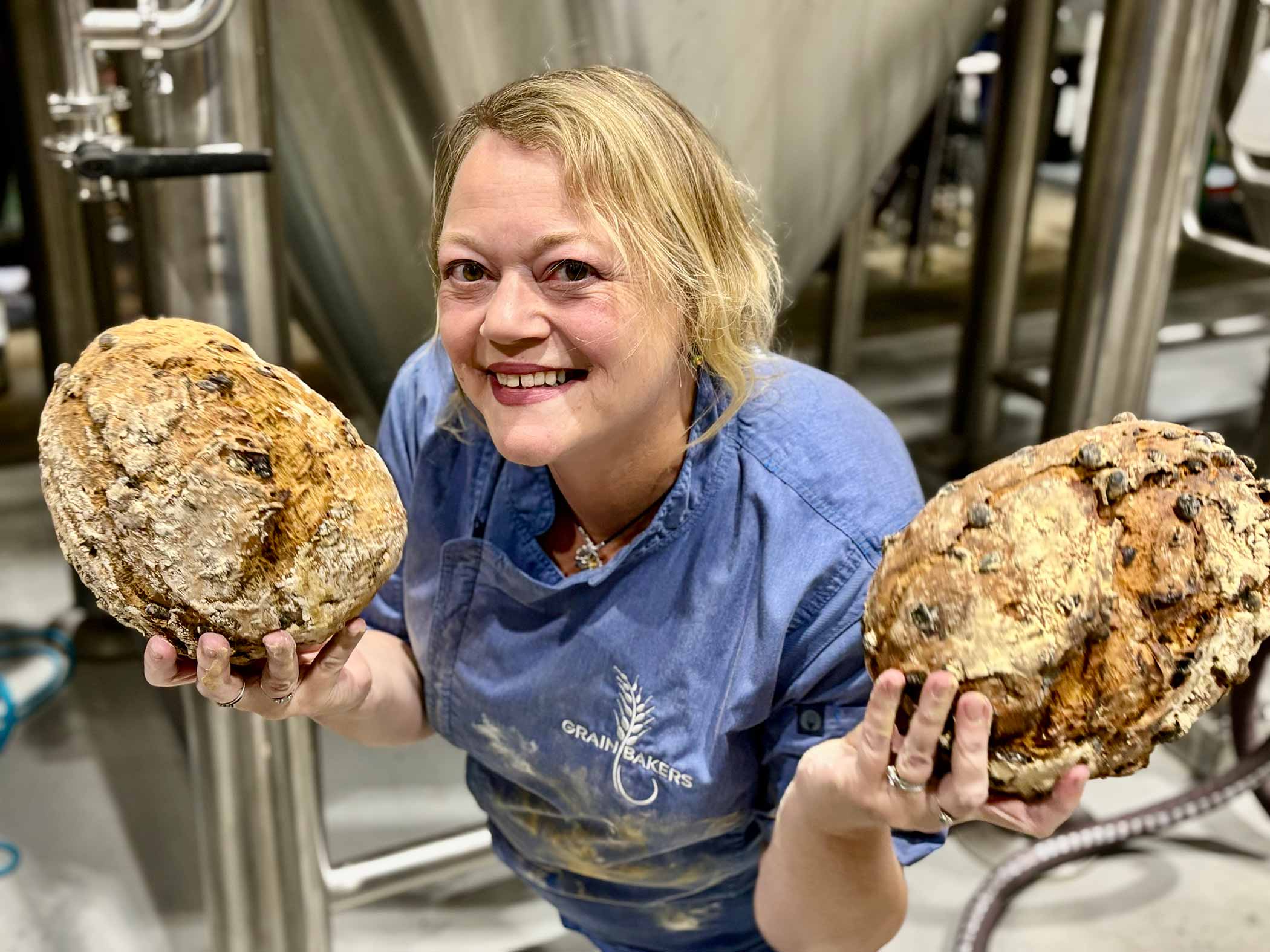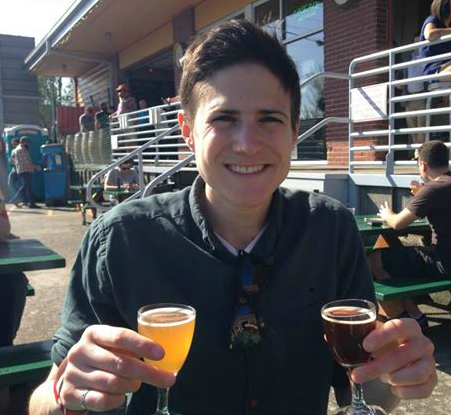Shop
Grainbakers: Shaping Community One Loaf and Pint at a Time
Top Stories:
I pulled my hands out of the bowl and held them up in front of my face in awe. Covered tip to palm in a thick sticky paste, my fingers felt like I’d dipped them into a plaster cast. Laughing with my partner, we shaped the scraggly pile of yeast, bread flour, and the leftovers from a batch of stout into a ball of dough, setting it aside to proof. I wiped my hands off and took a swig of my Mare Island Mud Puppy brown ale.
To my left, a group of three ladies were a couple of steps behind us, mixing two ounces of salted butter, ten ounces of room-temperature milk, and molasses in a bowl.
“Molasses is our secret ingredient,” Grainbakers Founder Caitlin Jewell told our class of forty.
We’d all gathered at Mare Island Brewing Company in Vallejo, CA, on a Thursday night for one of Jewell’s Grainbakers events, a class that teaches people how to bake with spent grain.
The real secret ingredient here.
A byproduct of the brewing process, spent grain is often sent to farmers. But Jewell’s innovative series of classes that rotate at taprooms throughout the country makes baking with byproducts fun and engaging while bringing welcome traffic into a community space.
It’s a win-win for breweries at a time when they’re struggling to get feet off the street.
All in the name of shaping community one ball of dough and glass of beer at a time.
From Dog Treats to Date Nights
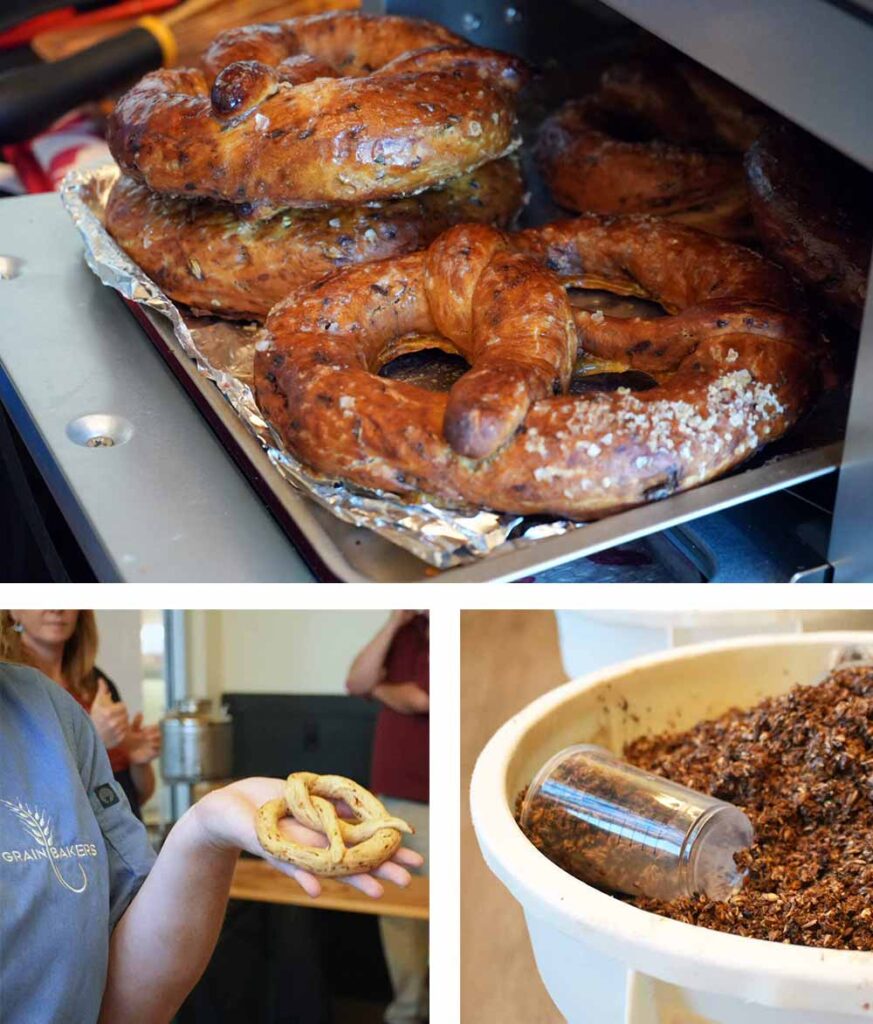
Photography courtesy of Grace Lee-Weitz | Hop Culture
In 2011, Jewell and her partner Jeff Leiter launched their own brewery, Somerville Brewing Company.
The entrepreneurs, who formerly owned an ad agency, ran the neighborhood brewery for about ten years before burning out and closing the doors for good during the pandemic.
Taking time to “reconnect with family, make art, and just chill,” Jewell says they moved across the country to California.
In a period of transition, Jewell started Grainbakers. The company travels around to different taprooms hosting classes that teach you how to bake goods, like breads or pretzels, with spent grain.
Having worked in the beer industry, Jewell is no stranger to this brewing byproduct.
“Jeff used to dump spent grain in a pile next to our trash can,” she recalls.
At the time, the couple had an elderly beagle who wouldn’t take his medicine. To hide his pills, Jewell learned how to make spent grain dog treats.
“You could put his medicine in cheese and meat, and he would eat the food, spit out the pill, and look you in the eye,” laughs Jewell. “So I made spent grain ravioli to trick him into taking the meds.”
During a particularly slow Tuesday at the brewery, Leiter asked Jewell, “What are you going to do to put butts in seats!?”
Almost at a loss, Jewell had a eureka moment. Why not teach a spent grain breadmaking class?
The classes took off at the brewery and beyond, with businesses booking classes for their executives and local universities offering them in their course catalogs.
Eventually, other breweries came calling, looking for a way to “put butts in seats” in their own taprooms.
“Chris from Idle Hands called me and was like, ‘Dude, my Wednesdays are bad; would you come over here and teach this?” says Jewell, who took her show on the road.
When the pair closed Somerville Brewing Co. and moved to California, Jewell thought her baking days were over.
But they were only just beginning.
“When I got out here, I saw a real hole in the market for something fun to do at a brewery that wasn’t paint night,” she explains, pausing to go check on a loaf of bread in the oven.
Testing a recipe for a class that night at Barebottle in San Francisco, CA, Jewell’s lemon poppy seed bread featured a few dozen lemons she’d harvested off her own tree. “The house smells really good,” she told me as she sat back down.
After logging almost thirty thousand miles and teaching classes at more than thirty breweries for the past couple of years, Jewell’s mission to help local breweries rise is just getting started.
Shaping Community
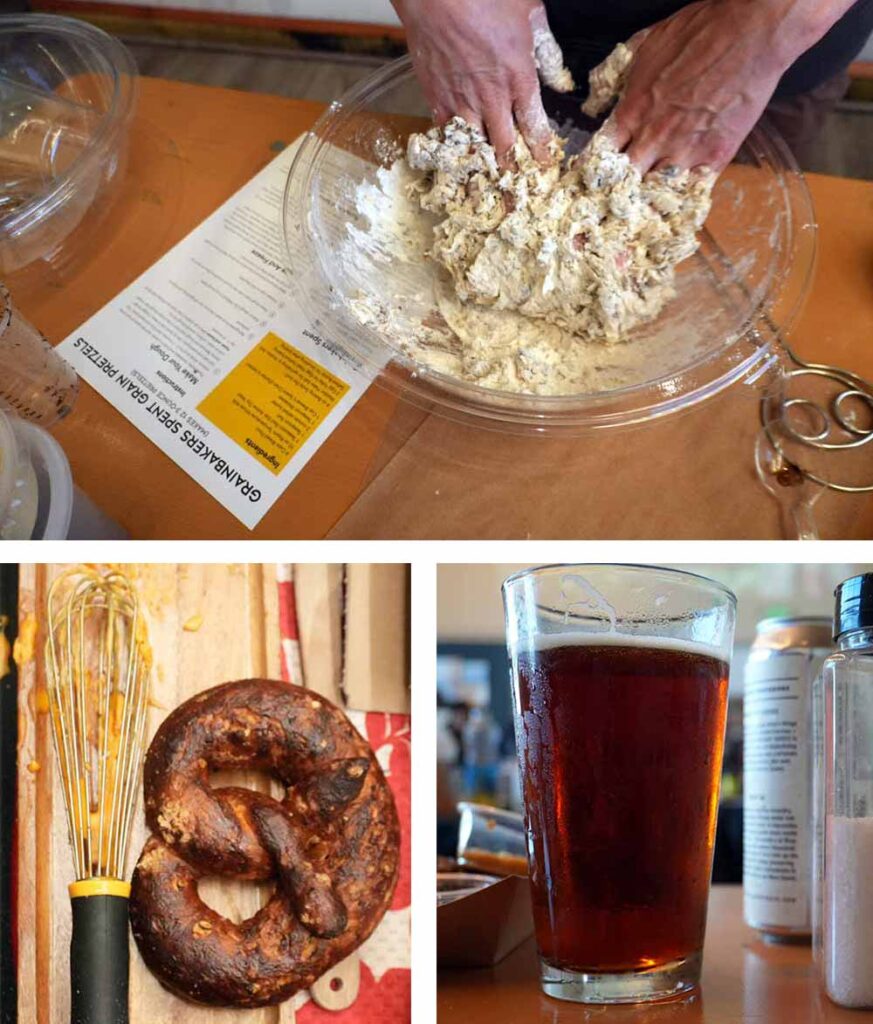
Photography courtesy of Grace Lee-Weitz | Hop Culture
“We’re doing a spent grain edutainment breadmaking class,” Jewell tells me when I ask her what Grainbakers is all about. “The mission is to help small, independent American breweries activate on really rough nights of the week and help elevate their stature with their communities, reminding people they exist.”
Mare Island Brewing Co-Founder Ryan Gibbons has done six classes with Jewell. He always personally gives a tour of the brewery to participants. At the class I attended, he explained the entire brewing process and showed us a bin of the spent grain from Mare Island’s Coal Shed Stout that we’d be using in the class.
Mostly a grist of a grain called Midnight wheat, two-row barley, and a bit of Maris Otter malt.
“It’s really dark and beautiful,” says Jewell.
He says it’s very common for people to come up to him excitedly and say, “I’ve never done anything like this.”
“I sometimes call it a brew-to-table moment,” says Gibbons. “Everybody’s just super excited to have an inside look at the brewery and now understand … the beer they’re drinking produced the grain you have that’s now in the bread you’re enjoying.”
It’s a type of engagement that Gibbons says you really can’t put a price on.
During our Thursday night class, we packed Mare Island’s spare room. In a few hours, with the music cranking, we got hands-deep in flour, rolled dough, and sipped beer.
“Obviously, on those nights, our revenue sees a nice spike,” says Gibbons. “If even half of the people in the class get a beer, that’s a win.”
A former brewery owner herself, Jewell understands breweries’ current struggles.
“Things aren’t great, and they’re struggling,” she says. “You have to support your small American brewery, or you’re not going to have them anymore. And so I think that there’s an absolutely urgent call to arms to protect and defend these businesses right now.”
At Grainbakers, Jewell says she’s encouraging people to get back to thinking about “how to make things with their hands and their hearts.”
That’s how you shape a community.
The Recipe for Rising Together: The Proof Is in the Proof
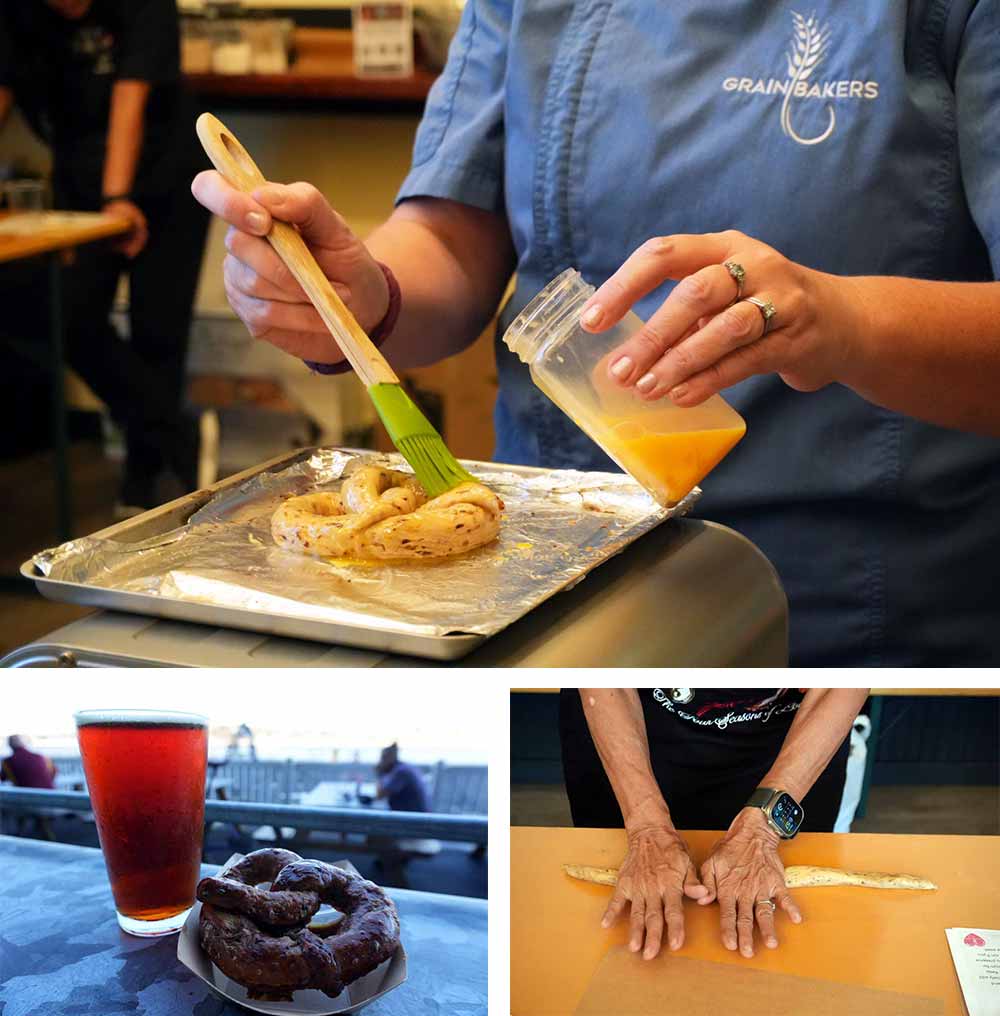
Photography courtesy of Grace Lee-Weitz | Hop Culture
After a quick tour, Gibbons takes us back to start baking our pretzels.
Jewell’s classes aren’t structured like a typical cooking class. With Grainbakers, it’s more like a party than a procedure.
“You’re not at a cooking school station,” says Jewell, who loves seeing people courageous enough to get out of the house during the week to do something that frightens them.
Those like Janet Livingston, a Bay Area resident and self-proclaimed serial class-taker.
“If you offer a class on something,” says Livingston, “I’ll show up and take it,” especially if it involves baking or cooking.
After coming across a Grainbakers’ class on Eventbrite, Livingston, who doesn’t drink beer, signed up.
After her first class at S27 Alehouse and Brewery in San Jose, Livingston decided to follow Jewell wherever she went.
“I was a fish out of water in a brewery,” says Livingston, who was drawn in by Jewell’s infectious personality. “I felt at home.”
Livingston has now volunteered and helped out at about twenty-five of Grainbakers’ classes in the Bay Area.
At Mare Island, Jewell immediately makes us feel like we’re in her own kitchen. She quickly takes us through about five different stations, including dough making, pretzel rolling, pretzel baking, and a couple of sauce stations—beer mustard and cheese.
Grainbakers is more like a “choose your own adventures,” says Livingston.
If you just want to roll out strands into ropes, go for it.
If you’re looking for a challenge and want to shape the perfect pretzel, it’s all you.
Or if you just want to drink a couple of beers and mix dough by hand, you’re a champion, too.
Jewell won’t be hurt if you just come to the class to drink beer and chat.
“If you are not excited about making the dough by hand, I will not judge,” says the chef in her sky blue chef’s jacket with Grainbakers stamped across the heart. For those folks, Jewell does the work beforehand, pre-portioning batches of frozen dough.
After about twenty minutes of short demos, Jewell cuts us loose. With the music cranking and the conversation flowing, the class becomes a party.
“We’re going to let chaos break,” she almost shouts. “Make some pretzels!”
While I mixed flour, yeast, butter, and spent grain at my table, a few couples to my right, shaped balls of dough into twenty-eight-inch ropes.
Jewell stood watching on, explaining that the trick here is to work quickly. “Thirty seconds, thirty pushes,” she said to the group. The longer you work it, the more the dough warms up, and as the yeast wakes up, it starts to rise. “If you overwork it, that’s where it goes to hell!”
Jewell has a recommendation for the table.
“After rolling thousands of pretzels, I discovered the real secret,” she says with a little gleam in her eye. “Work with frozen dough.”
While we continue to whisk and roll, Jewell bops to the center of the room. For those curious, she demonstrates perhaps the trickiest part of the class: shaping the pretzel.
In a few deft movements, she brings the ends of the rope together, crosses the legs, and flips the whole braid up.
Presto pretzel.
To boil the twisty shapes, Jewell gives us another tip.
Typically German pretzels get their characteristic dark crust by dipping them in a lye solution. Jewell shares that this can be potentially dangerous. Instead, “when I was trying to make a brown pretzel that didn’t burn the house down,” she came up with a new method. She places the twisted dough in a solution of eight cups of boiling water and four ounces of baking soda that she baked for an hour at 250 degrees to turn into sodium bicarbonate. “It will make your pretzels browner and saltier,” she explains.
Using a slotted spoon, Jewell submerges the pretzel for about twenty seconds before taking it out and placing it on parchment paper, where she brushes it lightly with egg yolk (another pro tip).
As a final flourish, Jewell dips her hands into some salt, sprinkling a few flecks over the top.
She encourages us to get creative.
“Lately, my family has been homesick, so we’ve been topping them with New Hampshire maple syrup,” she says, explaining her kids will also just dump straight sugar on them. “Yeah, we’ve been losing it!”
As the last step, Jewel pops her pretzel into her little oven to bake for twelve to fifteen minutes at 425 degrees.
While the twisty bread bakes, she continues moving around the room, encouraging, laughing, and instructing.
It’s one of her favorite parts of the class.
When she can step back, she sees “all of a sudden, the room is lit,” she shares. “People are just having a party.”
Breaking Bread, Baking Bread
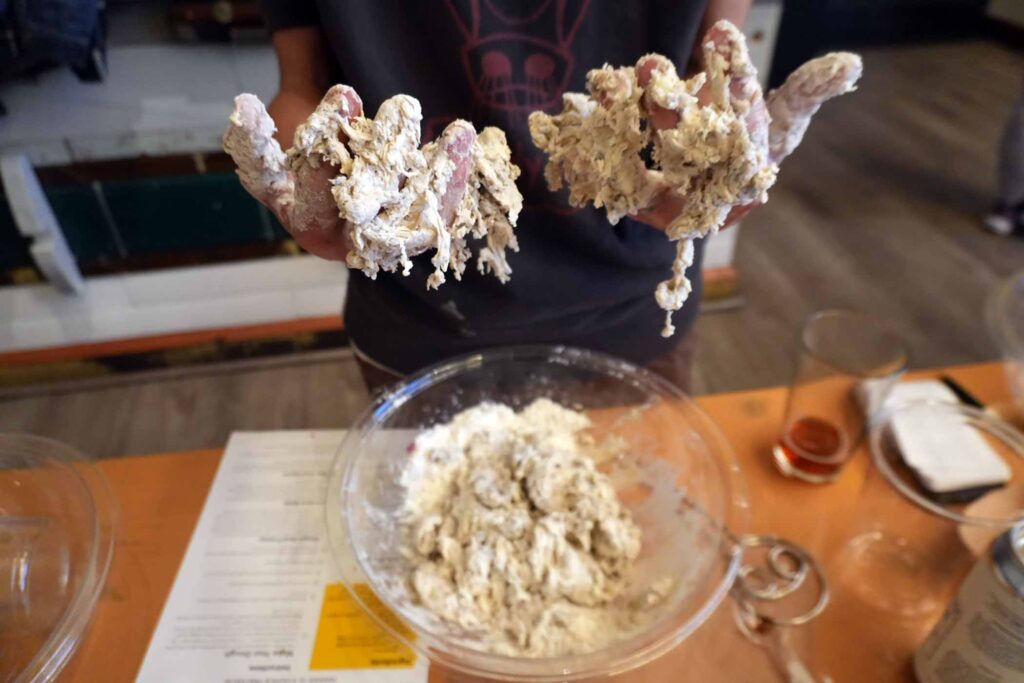
Photography courtesy of Stacey Lee-Weitz | Hop Culture
Like every loaf of bread or braid of pretzel, each class at each brewery is a little different.
“You can see there’s all different walks of life in a class,” shares Gibbons. “You’ve got people that are on date nights, people that are a friend group that is just looking for something to do. Sometimes it’s just a retired couple of them. It’s just like, hey, let’s get out of the house tonight and go make some bread.”
My partner and I had made it a date night ourselves while a trio of ladies next to us had come out as friends.
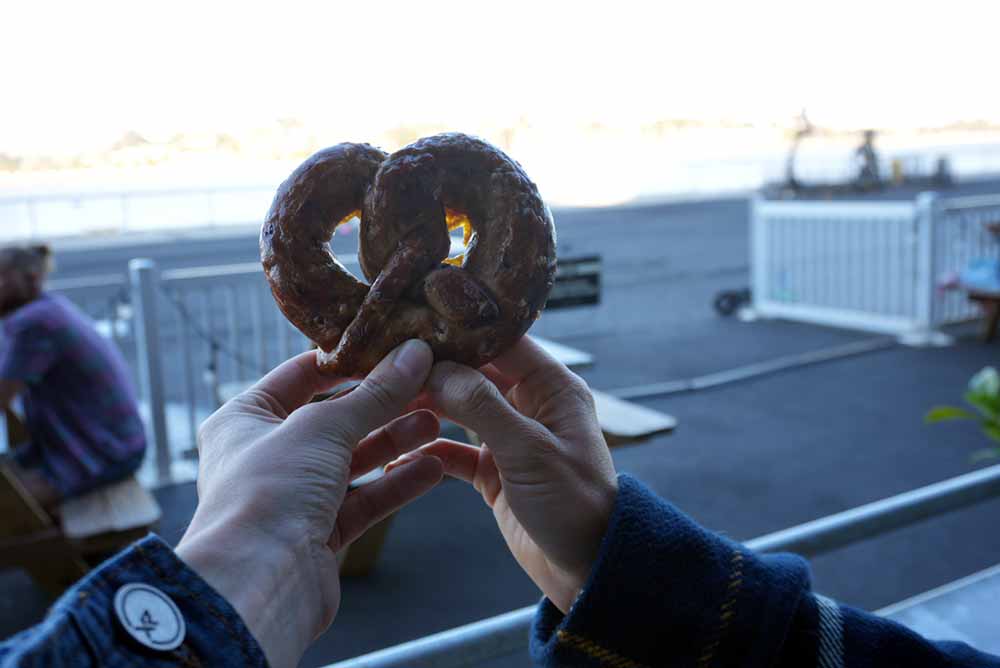
Photography courtesy of Grace Lee-Weitz | Hop Culture
Joyce Matthews heard about Grainbakers from her friend who in turn found it on Instagram. The second-time participant brought back her two girlfriends; they all lived a twenty-minute drive away.
“It’s bringing business for the brewery on a slow night,” explains Matthews, who is no stranger to baking.
Her friends chime in to tell me that Matthews recently sold a dozen of her coconut oatmeal chocolate chip cookies at a fundraising auction for over fifty dollars. They joke that she could go on the Great British Baking Show.
As we took a break from mixing dough, the baking hobbyist explains to me that she appreciates the combination of baking and drinking.
“There’s like a two-beer maximum where you [hit] your peak in baking,” she laughs.
I can’t say that she’s wrong.
But baking isn’t the only mystical thing happening after two beers at a Grainbakers class.
This sense of camaraderie and community bubbles away right underneath the surface. Usually cracked smoothly after a couple of pints.
“The vibe is approachable, welcoming, encouraging, and fun,” says Livingston, who often sees first-timers come to the class a little apprehensive. “Don’t take yourself too seriously. You can’t really mess up.”
She adds, “I like to see, at the end of class, people who came in uncertain or skeptical leave with their successfully made ball of dough and big smiles on their faces!”
Jewell recalls a class at Pizza Port (which has an excellent sound system) that played her playlist just a little too loud. Almost sixty people just got into a circle and started dancing.
At the faith-based Brethren Brewing Company in Manteca, CA, a group of twenty women taught Jewell how to line dance. “When they were supposed to be mixing bread, we just stopped and had a line dancing lesson,” she recalls. “That was so rad!”
You’re literally breaking or baking bread with people you’ve never met before.
“You’re meeting different people in a community that you may have seen in the grocery store, but now you’re coming together and making bread,” says Gibbons.
That’s the magic of Grainbakers.
And it doesn’t stop at just the camaraderie.
Shaping Sustainability
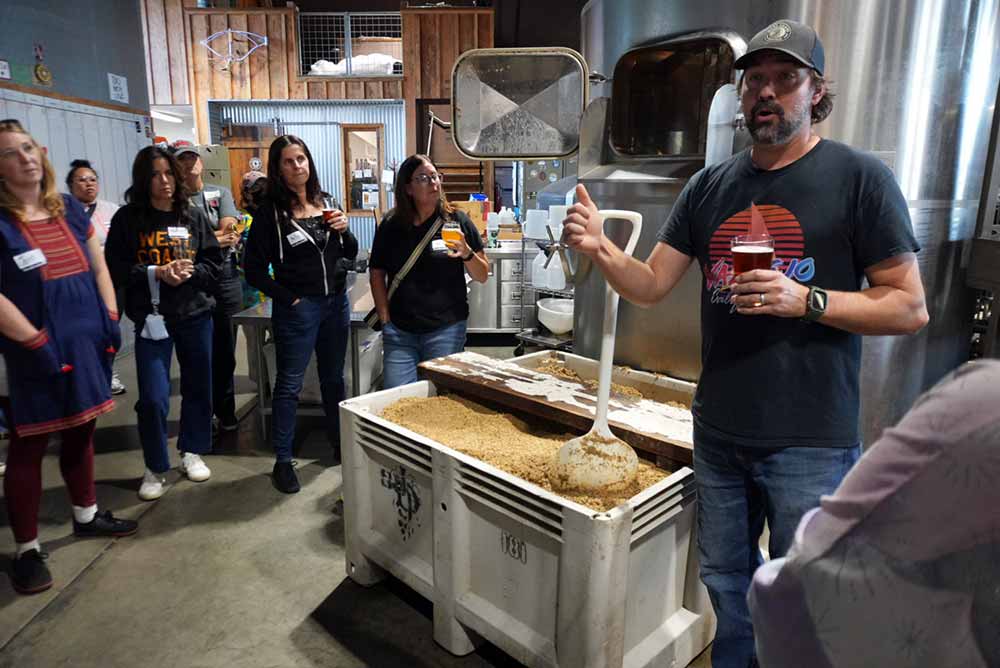
Mare Island Brewing Company Co-Founder Ryan Gibbons explains spent grain to a Grainbakers class | Photography courtesy of Grace Lee-Weitz | Hop Culture
“I try to say it every time: Brewing is not green,” says Gibbons. “Any way that we can find a way to incorporate our byproducts into something else is just a win-win for everybody.”
After doing some back-of-the-napkin math for us, Gibbons estimated that Mare Island produces around four tons (or 8,000 pounds) of spent grain a week.
For most of its spent grain, Mare Island partners with Crane Ranch in Sonoma. About twice a week, a farmer comes to pick up the grain, feeding it to his sheep.
Grainbakers doesn’t exactly put a huge dent in the amount of spent grain Mare Island produces, but it’s something. Jewell says a class typically uses four or five five-gallon buckets, which, depending on the grain, weigh out to 200-250 pounds (so if our math is right, about .1 percent of the spent grain Mare Island makes in a given year).
Jewell encourages folks to come back to the brewery to pick up spent grain themselves, stopping in for a beer or two as well, of course.
It’s an everlasting ecosystem.
Let the Good Times Rise
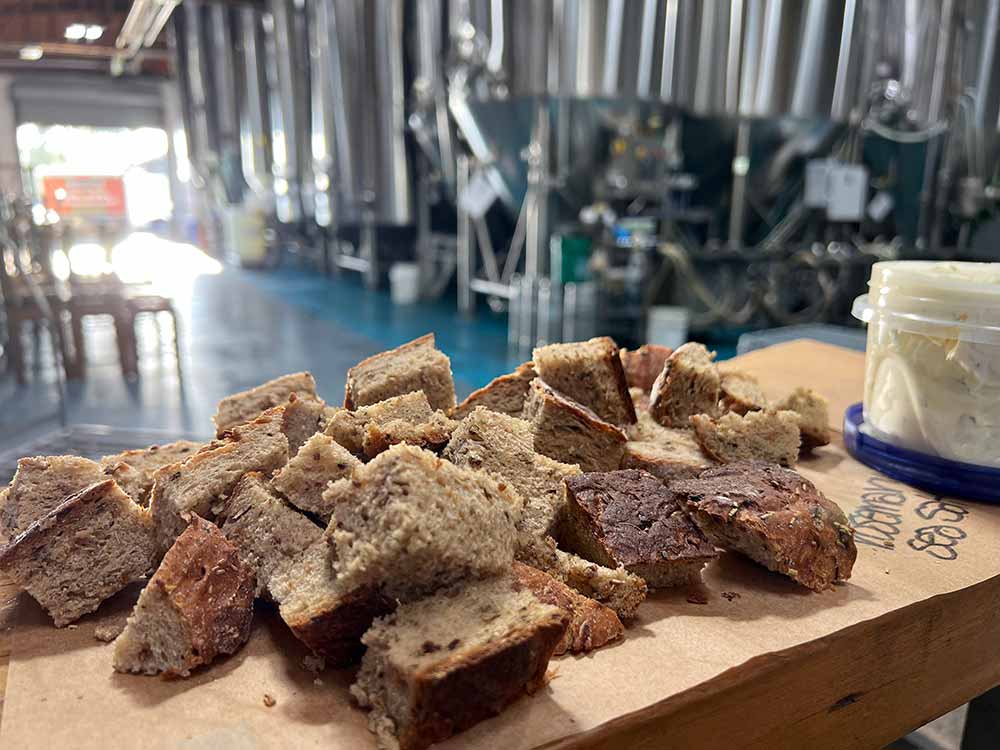
Photography courtesy of Grainbakers
You know what they say: The proof is in the proof, right?
With 3,400 participants, Grainbakers has become its own living, breathing community, with people consistently coming back for two, three, or even four classes.
“I’ve made the joke so many times. On the third class, you’re joining me as a paid assistant,” laughs Jewell, who is always amazed by those who come more than once.
Those like Livingston, who has now helped Jewell at twenty-five of her Grainbakers classes over the last two years. And shows no signs of slowing down, mentioning an upcoming class she’s attending at Devil’s Canyon.
Jewell has an ambitious plan for 2025, noting she has about fifteen breweries on the schedule for classes in just the next fifteen weeks.
“I like to say I’m the lamest touring band you’ve ever met,” laughs Jewell.
Doesn’t sound lame to us at all.
After a couple of hours at Mare Island, folks start to box up their dough, pack up cups of spices, drain the dregs of their pints, and prepare to head home.
Before we all leave, Jewell leaves us with one last tip.
“If I can help these little breweries, that’s huge for me,” she says, passing on the torch to us. “Save your brewery!”
Because that’s the only way, as Jewell likes to say, that we can rise together.
How Can I Take a Grainbakers Class?
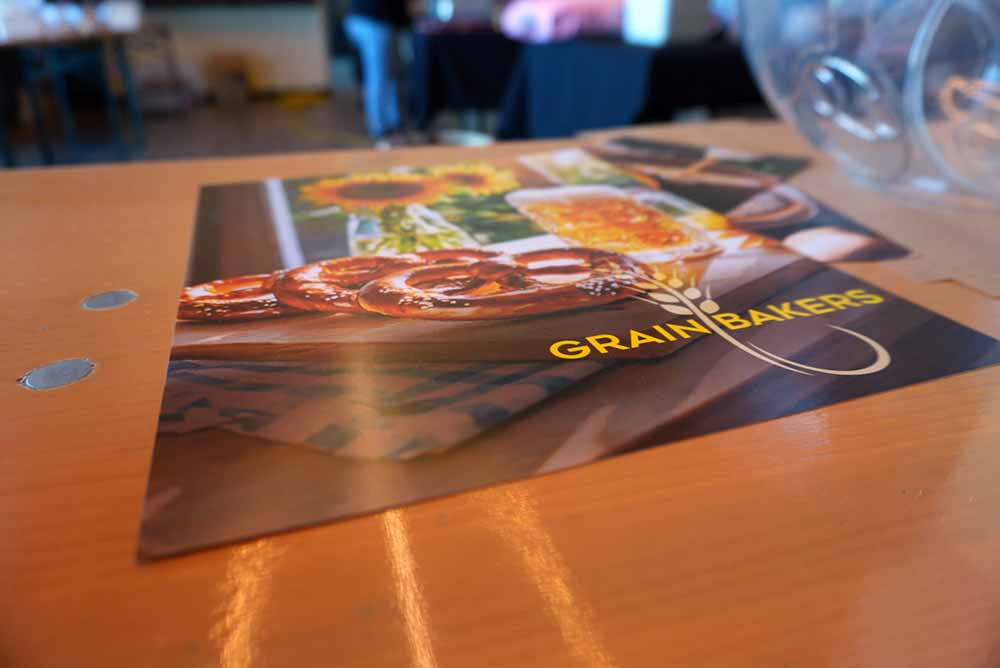
Photography courtesy of Grace Lee-Weitz | Hop Culture
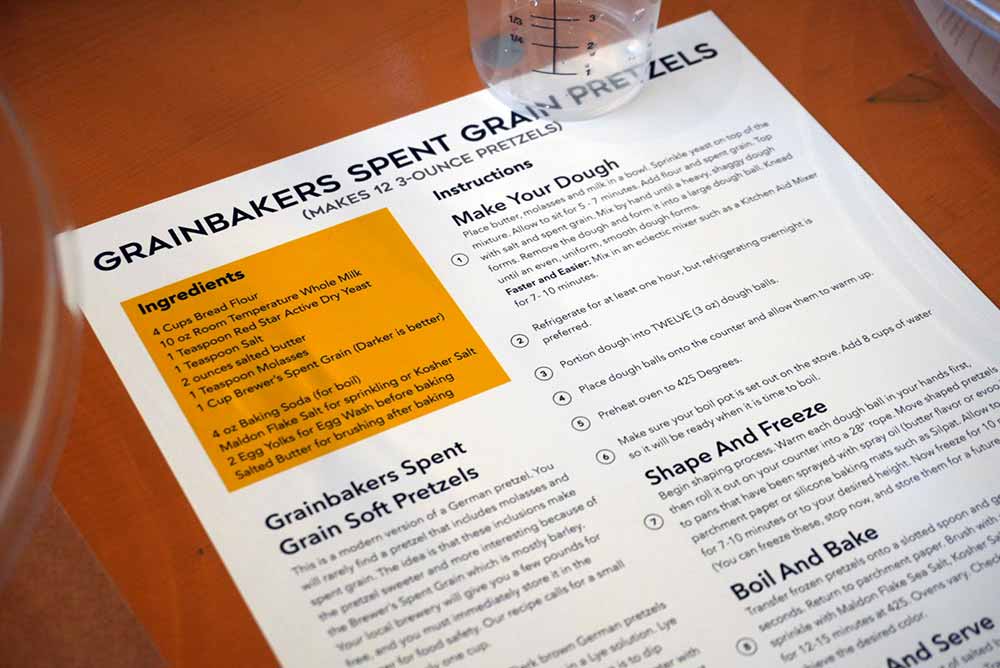
Photography courtesy of Grace Lee-Weitz | Hop Culture
It’s easy, just sign up!
Hit the button to take a look at all the classes and see if there is a Grainbakers class offered at a brewery near you.

